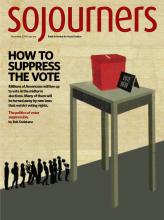OUTSIDE OF BUSINESS circles, accountability is rarely a popular conversation topic. Its implications of deference to authority and limitations on personal freedom are at odds with Western cultural trends. But the controversies that have dogged evangelical pastor Mark Driscoll demonstrate the need for Christians and churches to think more seriously about how authority is understood, exercised, and appropriately checked.
Driscoll, a best-selling author and pastor of Mars Hill Church in Washington state, is known for preaching a “muscular” brand of Christianity and a personal arrogance that fits the part. His views and provocative statements on gender roles, homosexuality, and a variety of other topics have repeatedly sparked debate within evangelicalism, but recent revelations that he pseudonymously posted offensive comments on an online church message board have justifiably brought condemnation from many.
Yet Driscoll’s theology is not the only thing landing him in hot water. A group of more than 20 former Mars Hill pastors have filed a formal grievance with the church based on Driscoll’s leadership style and actions that have been labeled intimidating, controlling, and abusive. Revelations that church funds were spent to buy copies of his book in the hopes of making it a New York Times bestseller and allegations of plagiarism resulted in a formal apology and his publisher pulling books from store shelves. This fall, Driscoll took a multiple-week leave of absence and sought counseling while the church reviewed the complaints against him.
Read the Full Article

